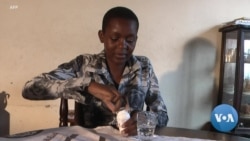ໃນອາທິດທີ່ຜ່ານມາ, ບັນດາຜູ້ນຳໂລກຢູ່ກອງປະຊຸມສະມັດຊາໃຫຍ່ອົງການສະຫະປະ
ຊາຊາດ ໄດ້ຍິນການເຕືອນຕ່າງໆ ກ່ຽວກັບ ການສູນເສຍຊີວິດຂອງຜູ້ຄົນຈຳນວນຫຼວງ
ຫຼາຍ ແລະ ພະຍາດຕ່າງໆທີ່ອາດໝູນວຽນໄປທົ່ວໂລພາຍໃນພຽງສາມມື້. ນັກຂ່າວວີ
ໂອເອ ແຄໂຣລ ເພຍສັນ ລາຍງານວ່າ ກຸ່ມຕິດຕາມການກຽມພ້ອມພິເສດທົ່ວໂລກ ໄດ້
ອອກລາຍງານສະບັບນຶ່ງວ່າ ການບໍ່ດຳເນີນງານຫຍັງ ຈະກໍ່ໃຫ້ເກີດຜົນທີ່ຕາມມາຢ່າງ
ໂຫດຮ້າຍ. ລາຍງານໄດ້ກ່າວວ່າ ການປ້ອງກັນ ແມ່ນຕ້ອງໄດ້ອາໄສການດຳເນີນງານ
ດ້ານການເມືອງ ແລະ ສັງຄົມຢ່າງໜັກ ພ້ອມກັບການປິ່ນປົວດ້ານການແພດທີ່ດີ. ເຊິ່ງ
ພຸດທະສອນ ຈະນຳລາຍລະອຽດມາສະເໜີທ່ານໃນອັນດັບຕໍ່ໄປ.
ໂຣກ ເອດສ໌ ບໍ່ແມ່ນໄພຂົ່ມຂູ່ທີ່ມັນເຄີຍເປັນອີກຕໍ່ໄປແລ້ວ. ການປິ່ນປົວໄດ້ປ່ຽນແປງມັນ,
ແລະ ການຄົ້ນຄວ້າ ກ່ຽວກັບ ຢາວັກຊີນກໍເຕັມໄປດ້ວຍຄວາມຫວັງ.
ມັນຍັງໄດ້ມີການເວົ້າໃນປະຈຸບັນນີ້ ກ່ຽວກັບ ການເຮັດໃຫ້ໂຣກມາເມເຣຍສິ້ນສຸດລົງ.
ໄຂ້ມາເລເຣຍ ໄດ້ສັງຫານປະຊາຊົນເຄິ່ງລ້ານຄົນໃນແຕ່ລະປີ, ສ່ວນຫຼາຍແມ່ນເດັກ
ນ້ອຍ.
ບັນດານັກວິທະຍາສາດ ກໍໃກ້ຈະສາມາດຢຸດໂຣກ ອີໂບລາ ໄດ້ເຊັ່ນກັນ. ຢາວັກຊີນທີ່
ໃຊ້ເພື່ອປ້ອງກັນໄວຣັສ ອີໂບລາ, ບວກກັບຢາໃໝ່ສອງຊະນິດເພື່ອປິ່ນປົວຜູ້ເຄາະຮ້າຍ
ນັ້ນ, ແມ່ນໄດ້ຊ່ວຍຊີວິດຂອງຄົນຈຳນວນຫຼາຍໃນສາທາລະນະລັດ ປະຊາທິປະໄຕ
ຄອງໂກ. ໂຣກອີໂບລາ ເຄີຍສັງຫານຜູ້ເຄາະຮ້າຍຂອງມັນເຖິງ 90 ເປີເຊັນ. ແຕ່ຕອນນີ້,
ມັນໄດ້ເປັນສິ່ງກົງກັນຂ້າມ ຖ້າມັນມີຈຳນວນໄວຣັສໃນເລືອດຂອງຄົນຢູ່ລະດັບທີ່ຕ່ຳ.
ດຣ. ແອນໂທນີ ໂຟຊີ, ຈາກສະຖາບັນເພື່ອສຸຂະພາບແຫ່ງຊາດ ກ່າວວ່າ “ຖ້າເຈົ້າມີ
ເຊື້ອໄວຣັສໜ້ອຍ, ການຕາຍກໍຈະຫຼຸດເຫຼືອປະມານ 10 ເປີເຊັນ.”
ດຣ. ແອນໂທນີ ໂຟຊີ ເປັນຜູ້ນຳໜ້າການຄົ້ນຄວ້າ ກ່ຽວກັບ ພະຍາດຕິດຕໍ່ຢູ່ສະພາບັນ
ເພື່ອສຸຂະພາບ ແຫ່ງຊາດ ສະຫະລັດ. ທ່ານຍັງເປັນສະມຊິກຂອງຄະນະກຳມະການ
ຕິດຕາມການກະກຽມທົ່ວໂລກ.
ອົງການອະນາໄມໂລກ ແລະ ທະນາຄານໂລກ ໄດ້ຂໍໃຫ້ຄະນະກຳມະການດັ່ງກ່າວປະ
ເມີນຄວາມພ້ອມທົ່ວໂລກ ສຳລັບໂຣກລະບາດໃນຄັ້ງຕໍ່ໄປ.
ໃນລາຍງານສະບັບທຳອິດຂອງເຂົາເຈົ້າ, ຄະນະກຳມະການດັ່ງກ່າວໄດ້ເຕືອນວ່າ ໂລກ
ແມ່ນບໍ່ມີຄວາມພ້ອມຢ່າງໜ້າເປັນຫ່ວງ. ບໍ່ມີຄວາມພ້ອມຫຼາຍ ທີ່ໂຣກລະບາດໃນຄັ້ງຕໍ່
ໄປເຊິ່ງມີສາເຫດມາຈາກໄວຣັສທີ່ຮ້າຍແຮງ ຫຼື ແບັກທີເຣຍ ຫຼື ສານເຄມີອື່ນໆນັ້ນ ອາດ
ສັງຫານປະຊາຊົນເຖິງ 80 ລ້ານຄົນ ແລະ ກໍ່ໃຫ້ເກີດຄວາມຫາຍະນະທາງເສດຖະກິດ
ຢ່າງມະຫາສານ.
ດຣ. ໂກຣ ຮາເລັມ ບຣັ້ນແລນ (Gro Harlem Brundtland), ປະທານຮ່ວມຂອງຄະ
ນະກຳມະການຕິດຕາມການກະກຽມທົ່ວໂລກ ໄດ້ກ່າວວ່າ “ຖ້ານີ້ແມ່ນການກະກຽມ
ປ້ອງກັນ ຫຼື ກອງທັບໃນປະເທດຂອງເຮົາ, ມັນຈະບໍ່ມີແຕ່ລັດຖະມົນຕີປ້ອງກັນປະເທດ
ເທົ່ານັ້ນ ແຕ່ລັດຖະບານ ແລະ ນາຍົກລັດຖະມົນຕີ ຫຼື ປະທານາທິບໍດີທັງໝົດຈະເປັນ
ຜູ້ຮັບຜິດຊອບ. ມັນຕ້ອງເປັນຄືກັນໃນການຮັກສາຄວາມປອດໄພດ້ານສຸຂະພາບທົ່ວ
ໂລກ.”
ໃນລະຫວ່າງການເດີນທາງຄັ້ງຫຼ້າສຸດໄປ ອາຟຣິກາ ຕາເວັນອອກນັ້ນ, ດຣ. ໂຟຊີ ໄດ້
ມີຄວາມດີໃຈກັບການປະຕິບັດການທາງການແພດ ທີ່ຄວບຄຸມໄວຣັສອີໂບລາ.
ດຣ. ແອນໂທນີ ໂຟຊີ ໄດ້ກ່າວວ່າ “ຂ້າພະເຈົ້າພູມໃຈຢ່າງແທ້ໆກັບຄວາມສາມາດຂອງ
ຊາວ ຄອງໂກ ຜູ້ທີ່ໄດ້ບໍລິຫານການປິ່ນປົວຢູ່ທີ່ນີ້, ພ້ອມກັບການກະກຽມ ຂອງຊາວ ຣາ
ວັນດາ ແລະ ອູການດາ, ໃນກໍລະນີໄວຣັສໄດ້ແຜ່ລາມຂ້າມຊາຍແດນ.”
ໃນລາຍງານປະຈຳປີຄັ້ງທຳອິດຂອງເຂົາເຈົ້າ, ຄະນະກຳມະການດັ່ງກ່າວໄດ້ອ້າງເຖິງ
ອຸປະສັກດ້ານການເມືອງ ແລະ ສັງຄົມ ເພື່ອປ້ອງກັນໂຣກລວມທັງຄວາມອັບປະຍົດທີ່
ມາຈາກໂຣກວັນນະໂລກ, HIV/AIDS, ອີໂບລາ ແລະ ໂຣກເຈັບປ່ວຍອື່ນໆ. ເຂົາເຈົ້າ
ຍັງໄດ້ອ້າງເຖິງການຂາດພື້ນຖານໂຄງລ່າງ, ນ້ຳສະອາດ ແລະ ສຸຂະອະນາໄມ ແລະ
ການຂາດເງິນທຶນ.
ດຣ. ໂກຣ ຮາເລັມ ບຣັ້ນແລນ ໄດ້ກ່າວວ່າ “ພວກເຮົາຕ້ອງໄດ້ມີການກະກຽມທີ່ແຂງ
ແກ່ນກວ່າເກົ່າຢ່າງທົ່ວເຖິງ ເພື່ອຫຼີກລ່ຽງການສູນເສຍຊີວິດທີ່ບໍ່ຈຳເປັນ ແລະ ການສູນ
ເສຍທາງດ້ານເສດຖະກິດກິດຢ່າງຫຼວງຫຼາຍ.”
ລາຍງານດັ່ງກ່າວໄດ້ເຕືອນວ່າ ສະຖານະການສັງຄົມໄດ້ເຮັດໃຫ້ພະຍາດທັງຫຼາຍແຜ່
ລາມ ລວມທັງຄວາມຂັດແຍ້ງທີ່ແກ່ຍາວ ແລະ ການບັງຄັບໃຫ້ຍົກຍ້າຍຖິ່ນຖານ. ເຂົາ
ເຈົ້າໄດ້ຮຽກຮ້ອງໃຫ້ປະເທດຕ່າງໆຈັດຕັ້ງການກະກຽມພາວະສຸກເສີນຈາກລະດັບທ້ອງ
ຖິ່ນຫາລະດັບສູງ ແລະ ເຮັດວຽກຮ່ວມກັນ, ທຸກໆບັນຫາການເມືອງ ທີ່ສາມາດປ້ອງກັນ
ການແຜ່ລະບາດຂອງພະຍາດ ແລະ ການສູນເສຍຊີວິຢ່າງຫຼວງຫຼາຍ.
ອ່ານຂ່າວນີ້ເພີ້ມເປັນພາສາອັງກິດ
This week, world leaders at the U.N. General Assembly heard warnings about massive loss of life and diseases that could circle the global in just three days. VOA's Carol Pearson reports that a special global preparedness monitoring group issued a report that says inaction will have grim consequences. The report said prevention heavily depends on political and social action as well as good medical care.
AIDS is no longer the threat it once was. Treatment has changed that, and research on a vaccine is promising.
There's even talk now about ending malaria. Malaria kills half a million people each year, most of them children.
Scientists are also closing in on Ebola. A vaccine to prevent Ebola, plus two new drugs to treat its victims, are saving lives in the Democratic Republic of Congo. Ebola used to kill up to 90% of its victims. Now, that's been turned around if there's a low amount of virus in a person's bloodstream.
"If you get a low viral load, the mortality goes down to around 10%."
Dr. Anthony Fauci heads research on infectious diseases at U.S. National Institutes of Health. He is also a member of the Global Preparedness Monitoring Board.
The World Health Organization and the World Bank asked the board to assess global preparedness for the next pandemic.
In its first report, the board warned that the world is woefully unprepared. So unprepared that the next pandemic caused by a deadly virus or bacterium or other agent could kill up to 80 million people and cause enormous economic suffering.
"If this had been the defense or military preparations in our country, it would not only have been the defense minister, but the whole government and the prime minister or president responsible. This has to be the same in global health security."
During a recent trip to East Africa, Dr. Fauci was pleased with the medical practices that are containing the Ebola virus.
"I was clearly impressed at the capabilities of the Congolese who are administering the care here, as well as the preparedness, of the Rwandans and the Ugandans, in case cases spill over the border."
In its first annual report, the board cited political and social obstacles to preventing disease including the stigma associated with TB, HIV/AIDS, Ebola and other illnesses. They also cited lack of infrastructure -- clean water and sanitation -- and lack of funding.
"We need to have a stronger preparedness across the board to avoid unnecessary loss of life and large economic losses."
The report warned that political situations that enable disease to spread include prolonged conflict and forced migration. They urged countries to establish emergency preparedness from the local level on up and to work with each other, all political issues that could prevent outbreaks of disease and huge loss of life.





